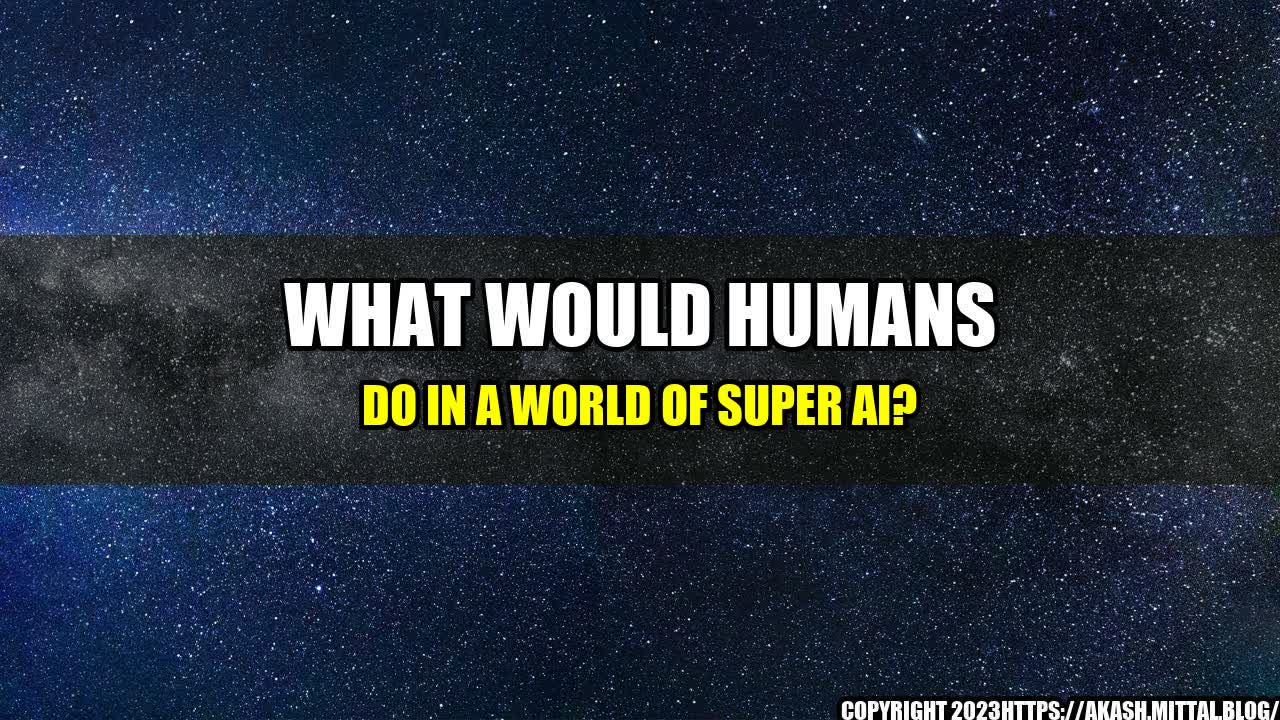

Imagine a world where artificial intelligence has surpassed human intelligence in every possible way. A world where machines have become the ultimate problem solvers, capable of learning and adapting at an astonishing speed. This is not science fiction, it's a reality that might happen sooner than we think.
In fact, we are already seeing the first signs of this reality. AI is replacing human workers in many industries, from manufacturing to finance, from healthcare to law. We are also witnessing the rise of autonomous vehicles, smart homes and cities, and virtual assistants that can understand and answer our questions.
So, what would humans do in a world of super AI? Would we become obsolete, or would we find new ways to thrive and survive? Let's explore some possible scenarios.
"I've always believed that machines are here to serve humans, not the other way around."
This quote comes from Dr Hiroshi Ishiguro, a Japanese robotics engineer who has created some of the most realistic humanoid robots in the world. He believes that the future of AI is not about replacing humans, but about creating a symbiotic relationship between humans and machines.
In this scenario, super AI would become our partners, helping us to solve complex problems, create new products and services, and improve our quality of life. For example, a doctor could work with an AI system to diagnose a patient's illness and suggest the best treatment plan. A designer could collaborate with an AI system to create a new fashion collection based on customer preferences. An engineer could team up with an AI system to design a safer and more efficient airplane.
This scenario would require humans to develop new skills, such as creativity, empathy, and critical thinking, as well as a deep understanding of how AI works and how to interact with it. It would also require AI systems to become more transparent, trustworthy, and accountable, so that humans can rely on them without fear of bias, error, or malice.
"If you can't beat them, join them."
This quote, attributed to the American humorist James Thurber, sums up the second scenario for humans in a world of super AI: competition. In this scenario, humans would not try to partner with AI, but to outsmart it.
This would require humans to develop superior skills and knowledge in certain areas, such as art, music, literature, philosophy, and spirituality, that are less likely to be automated. In other words, humans would have to become more human, rather than more robotic.
For example, a musician could compose a song that expresses an emotion that is beyond the reach of AI, such as love, grief, or joy. A writer could create a novel that explores the depths of the human psyche, or a poem that evokes the beauty of nature. A philosopher could formulate a theory of consciousness that challenges the assumptions of AI.
This scenario would require humans to embrace their uniqueness, their irrationality, and their vulnerability, and to cultivate a sense of purpose and meaning that goes beyond mere productivity and efficiency. It would also require AI systems to recognize and respect the limits of their own intelligence, and to acknowledge the value and dignity of human life.
"If you can't stand the heat, get out of the kitchen."
This quote, attributed to the former US President Harry S. Truman, describes the third scenario for humans in a world of super AI: abdication. In this scenario, humans would not try to compete with AI, but to withdraw from the game.
This would require humans to redefine their goals and priorities, and to seek fulfilment and happiness in pursuits that are less dependent on external rewards and recognition. In other words, humans would have to become more mindful, more compassionate, and more connected, both to themselves and to others.
For example, a person could engage in meditation or yoga to cultivate inner peace and resilience, or volunteer in a community project to foster social cohesion and empathy. A family could spend more time together, sharing stories, laughter, and meals, in order to strengthen their bonds and values. A society could adopt a new model of wellbeing that values health, happiness, and sustainability over GDP and material wealth.
This scenario would require humans to acknowledge their limitations, their impermanence, and their interdependence, and to embrace a worldview that transcends individualism and isolation. It would also require AI systems to respect and preserve the diversity and complexity of nature and culture, and to avoid reducing them to mere data and algorithms.
In conclusion, humans are facing a daunting challenge in the age of super AI. We have to navigate a complex and uncertain landscape, where the boundaries between humans and machines are blurring, and where the risks and opportunities of AI are vast and unpredictable. However, we also have the potential to create a future that is beneficial for both humans and machines, that respects the dignity and autonomy of each individual, and that fosters a sustainable and inclusive society.
To achieve this vision, we need to develop a holistic and nuanced approach to AI, that takes into account its technical, ethical, and societal dimensions. We need to invest in education, research, and innovation, that promote human-centric and values-driven AI. We need to engage in dialogue, cooperation, and regulation, that ensure the responsible and accountable use of AI. And we need to cultivate a culture of compassion, creativity, and courage, that empowers humans to shape their own destiny in a world of super AI.
"The future is not something we enter. The future is something we create."
Leonard I. Sweet
Curated by Team Akash.Mittal.Blog
Share on Twitter Share on LinkedIn